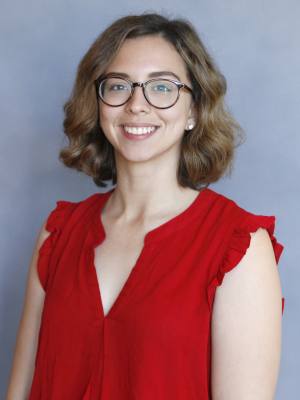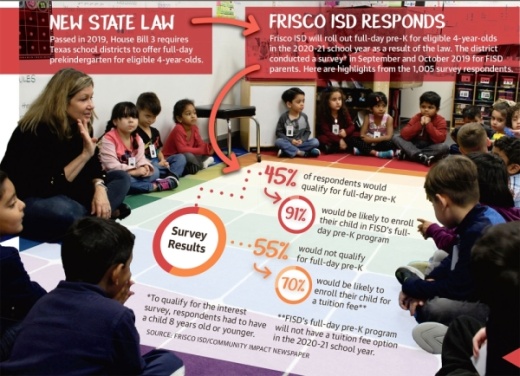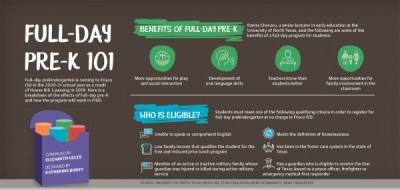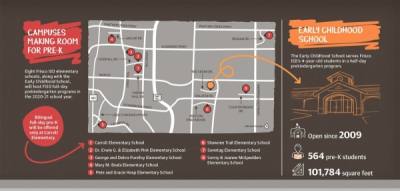The district hosts its half-day program for 4-year-olds at the Early Childhood School. The shift to a full-day program means that pre-K classes will also be added to Boals, Hosp, McSpedden, Pink, Purefoy, Shawnee Trail and Sonntag elementary schools. Carroll Elementary School will only offer bilingual pre-K.
This expansion is a result of Texas House Bill 3, which passed last year and requires school districts to convert existing half-day pre-K services for eligible 4-year-olds into full-day programs.
“We know that early childhood instruction and early intervention is a highly effective strategy in helping students,” said Melissa Ellis, FISD assistant director of early childhood instruction. “We know that full-day [pre-K] is even more effective.”
FISD will apply for a waiver for the 2019-20 school year to prepare for expansion. The district is now equipping campuses and hiring teachers for next school year.
Impact of full-day pre-K
Full-day pre-K is now mandated by the state, but expansion has been on FISD’s radar since the 2018 bond and tax ratification election, FISD Chief Financial Officer Kimberly Smith said.
District research indicates full-day pre-K helps students graduate high school, explore higher education, establish strong careers and be productive members of their communities, Ellis said.
The FISD full-day pre-K program will be based on guidelines set by the Texas Education Agency. Ellis said the curriculum will be more comprehensive than the half-day program.
“What they were getting in three hours, they will get more of and a higher quality of because we can go deeper and really solidify that foundation,” Ellis said.
Parent Andrea Kinder said she believes attending full-day pre-K through FISD will help students make a smoother transition to kindergarten. That is her goal for her son, William, who is in his third year at the Early Childhood School.
“Having a program that’s through Frisco ISD will have the curriculum and the structure that’s required to better prepare them for kindergarten versus going through private preschools,” she said.
Eligibility requirements
Full-day pre-K will come at no cost for qualifying students; that designation includes students from low-income families in the free and reduced price lunch program or students who meet the definition of homelessness.
Making pre-K a free, full-day program will offer greater access to high-needs families in FISD, said Ranita Cheruvu, a senior lecturer in early education at the University of North Texas.
“We know that early education and care is so important,” Cheruvu said. “But yet, it is so expensive.”
Also eligible for pre-K are students who do not speak or comprehend English. Cheruvu said students who speak another language at home already have language skills, and full-day pre-K will allow these students to put their skills to work.
“This is a chance for them to use those skills as they’re developing proficiency in English as well,” she said.
The district does not plan to allow students who do not qualify for its pre-K program to pay tuition to attend—at least, not in the first year. Ellis said the district is focused on maintaining the program’s quality.
“Once we know that we can serve all that do qualify [for full-day pre-K], then, we’ll consider adding that tuition option in the future,” Ellis said.
Registration for full-day pre-K will occur this spring and summer. At spring registration events in April, parents can bring their children to see whether they qualify for the program by scheduling an appointment time.
Those who qualify will be accepted into full-day pre-K during next school year, but Ellis recommends parents attend spring registration to ensure a pre-K slot closest to their home.
Who is paying for full-day pre-K?
While Ellis said FISD has wanted to roll out full-day pre-K for several years, funding has been a “big challenge” for the district. HB 3 gave FISD the push it needed to make the switch, said Smith, FISD’s chief financial officer.
“We were able to pass the [tax ratification election], and then, the next semester, House Bill 3 gave us the early education allotment,” she said. “It was kind of the perfect storm in terms of making the funds available to carry off something that [FISD and the community have] been talking about.”
FISD officials said they cannot know how much money will go toward the program in 2020-21 as enrollment will ultimately determine funding, Smith said. However, the district currently spends more on half-day pre-K than it receives in half-day funding.
“We expect it to be a similar situation, where we’re going to spend more on full-day pre-K than we receive for full-day pre-K,” she said.
FISD gets about $1.5 million in total from the state for half-day pre-K for the students it currently serves, Smith said.
“We expect that that early education allotment will be somewhere around $2 million based on estimates of our current [kindergarten through third grade] population,” she said.
Hiring teachers
Most of the full-day pre-K funding will go toward paying teachers, Smith said. FISD began hiring for the expansion in December and will hire as many teachers needed for enrollment. External hires could begin training in late February, Ellis said. These incoming teachers will spend three months shadowing current pre-K teachers.
“So when they start in August, it’s already like they’re a master pre-K teacher,” Ellis said.
Language and instructional coaches and assistant principals at the eight elementary schools will also receive assistance from the district to prepare for the expansion, FISD Special Programs Director Pam Orr said.
“Four-year-olds are a new age level for elementary schools,” she said.
All this preparation will allow the district to fill a need in the community, Ellis said. The state would have allowed implementation to delay up to six years, but she said the district wanted to reach students sooner rather than later.
“A full-day program—a lot of times, that may allow a parent to go to work,” Ellis said. “It goes beyond educating that particular 4-year-old sitting in our classroom, and if we can make life better for more families in Frisco, why would we wait?”







